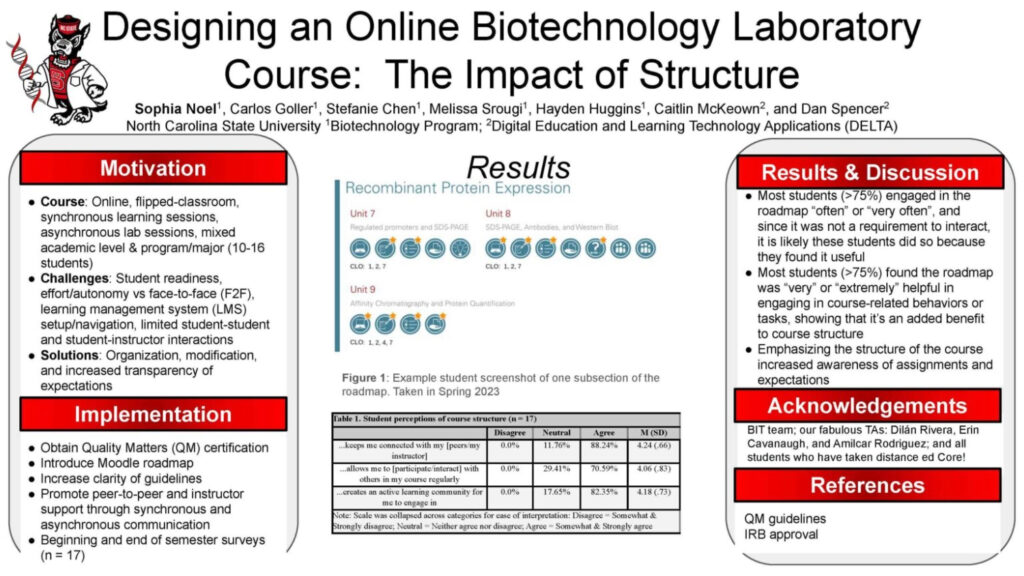High structure course design is a pedagogical approach that prioritizes student success through frequent, structured in-class activities, periodic feedback and instructor-facilitated peer-to-peer interactions. Characterized by clearly defined learning goals, high structure learning centers active learning opportunities to strengthen students’ long-term information retention and critical thinking skills.
This structured active learning format also encourages an equitable classroom environment. It takes into account and supports student diversity factors such as learning style, ethnicity, gender identity, neurodiversity and socioeconomic backgrounds. And research demonstrates that this format can reduce achievement gaps and increase students’ feelings of belonging while improving learning outcomes.
At NC State, many instructors have embraced high structure course design. The majority of courses offered in the interdisciplinary Biotechnology Program (BIT), for example, follow this structure. Instructors intersperse low-stakes weekly lab and lecture assignments with individual or group projects to promote active learning as students prepare for higher-stakes exams, providing frequent feedback along the way.
BIT 410/510 instructors Carlos Goller, Stefanie Chen, Melissa Srougi and Phillip Brown were concerned, however, that many of their students were unfamiliar with high structure as a pedagogical approach. Initially, they were reluctant to prioritize the frequent low stakes assignments and assessments because they wondered if the students would recognize the impact of this content on their grades.
“During the pandemic, the switch to online learning and subsequent development of a fully online version of our core course led to a rethinking of how to help students understand the value of these frequent assignments, which students often see as an unnecessary burden,” the instructors explained in the grant application.
To address this concern, the instructors partnered with DELTA on a 2023-2024 Exploratory Grant, Structured for Success: A Primer for Students. Their goal was to introduce students to the theory and approach to high structure course design using interactive digital resources.
“The idea was that better metacognitive awareness around high structure would result in students being more able to cope with the structure of the class in what is already a difficult course,” explained DELTA Research Specialist Paul Couture. His work conducting qualitative surveys with BIT students helped inform the direction of the grant.
The team of course instructors and TAs served as active partners equipped with a clear understanding of the long-term benefits of this approach. They believed that the students would be more motivated to learn and would experience greater success in this course and subsequent ones.
“We know working this way may be new to you,” the instructors explained to students in the introductory video. “It will help to think of this course as a long hike, not a sprint.”
Partnering with DELTA for Course Improvement
An interdisciplinary, intercollegiate program housed in the Executive Vice Chancellor and Provost Office, BIT brings together faculty from various disciplines across campus. Goller and Chen are housed in the College of Sciences, Srougi in the College of Veterinary Medicine and Brown in the BIT program. Though Biotechnology is not a major option, the program offers undergraduate minors and a graduate certificate.
These instructors rotate co-teaching sessions of BIT 410/510: Manipulation of Recombinant DNA, a lab-based course addressing the theory and practice of recombinant DNA cloning, screening and experimental design. In addition to the academic content, students gain experience working in a laboratory setting developing technical skills to prepare them for future jobs in industry.
BIT 410/510 has been the beneficiary of past DELTA collaborations, including a course design grant to develop a successful virtual lab experience during the COVID-19 pandemic, and the creation of an interactive roadmap to help students keep track of course tasks. The course also received Quality Matters (QM) certification through DELTA’s Course Quality program and has been the subject of academic presentations.

For this exploratory grant, Principal Investigators (PIs) Goller, Chen, Srougi and Brown wanted to ensure not only that their students understood why the course was organized using high structure course design, but also that students’ perspective of the course organization — what works, and what doesn’t — is taken into account for future iterations of the course. And they wanted to incorporate the voices of students who have been successful within the course.
“I’m really interested in student perceptions of course organization, as well as transparency of guidelines and communication policies,” said Goller.
The DELTA team got right to work. To develop a baseline understanding of students’ perceptions about the course structure and intended learning outcomes, Couture and Associate Director of DELTA Research and Analysis Chris Willis conducted a qualitative needs analysis based on the results of earlier student surveys. They found that students enjoy the course, particularly lab hours, and appreciate the instructors’ commitment, attentiveness and kindness.
Couture and Willis also found that the majority of BIT students were, in fact, familiar with high structure course design, and nearly 80% of them believed frequent low stakes assessments helped them stay current with course content. The data came as a bit of a surprise to the course instructors, who quickly pivoted to incorporate the student feedback from these initial DELTA surveys into revisions of the course design.
Student-friendly Deliverables
In tandem with assessing students’ understanding of high structure design, the grant PIs wanted to create interactive, asynchronous animations and videos explaining its theory and implementation strategies. Since BIT 410/510 is offered every semester, they wanted the content to be evergreen so that it can be used for other BIT courses and even across disciplines.
DELTA multimedia producer Arthur Earnest created several short Pro Tips videos that feature “near peers” — TAs and recent graduates who successfully completed the course — providing recommendations to students for course success. To appeal to students, the videos mimic the vertical video style popular on social media sites like TikTok and Instagram.

Pro Tips videos proved a success, with 37% of students reporting improved working habits after viewing them. “The videos were helpful at teaching things before you go into the lab since it can be hectic once things get going,” shared a BIT 410 student. Another student said, “The pro tips were useful as a refresher since it had been some time since I was in the lab.”
For the short animated videos outlining the theory of high structure, designer Meg Snyder used gaming metaphors and an engaging color palette to highlight specific points of emphasis in three segments:
Working with the PIs, Snyder and the DELTA team designed figures representative of the diversity of NC State’s students. Snyder also created an exam prep infographic for students preparing for high-stakes assessments.
Like the Pro Tips videos, the animations were successful. In a fall 2024 student survey, 34% of students reported that the animations improved their working habits, and 49% felt more comfortable working with the high structure format after watching them.
Assessing for Improvement
The student surveys administered at the outset of the grant in fall of 2023 proved lucrative for assisting the PIs in revising the course design and language around high structure for improved student success. But to ascertain that students were continuing to thrive in the high structure format following these changes, the DELTA researchers needed to retest for reliability.
BIT 410/510 students were again surveyed in spring of 2024 and fall of 2024 to assess their thoughts and perceptions of high structure course design in relation to their experience in the course. Notably, the fall 2024 results demonstrated statistically significant improvements in more than 20 areas as compared to the 2023 dataset.
Students in 2024 courses appear more motivated to apply what they are learning to other courses and collaborate with classmates, while being less inclined to “just get through” the course. And, students are now somewhat more likely to pursue a BIT minor or certificate after completing this course.
DELTA will continue to survey students in spring of 2025, and Goller, Chen, Srougi and Brown look forward to this continued partnership in pursuit of student success. Look for a presentation of their collaborative work on BIT 410/510 at the Conference on Faculty Excellence in March.
“Our DELTA team really took the time to understand our course and our needs,” said Chen. “The survey implemented by the assessment team helped us get a better sense of our students’ perspectives, and the media team created several impactful videos on approaching high structure courses that I hope will be widely shared and used.”
The PIs expressed gratitude to the DELTA grant project team, whose engaging and informative project deliverables are freely available to BIT students and anyone else interested in learning more about high structure course design:
- Project Lead: Rebecca Sanchez, Director, NC State Quality Enhancement Plan (DELTA Senior Instructional Designer at time of grant)
- New Media Lead: Donnie Wrights, Associate Director, Educational Media Design, Digital Learning
- Instructional Media Production: Arthur Earnest, Instructional Media Producer, Digital Learning
- Research and Analysis: Chris Willis, Associate Director, DELTA Research and Analysis
- Research and Analysis: Paul Couture, Research Specialist, DELTA Research and Analysis
- Graphic design and illustration: Meg Snyder
Considering implementing high structure design into your courses?
- Learn more about DELTA Exploratory Grants and sign up to receive grant communications
- Explore past grants projects by visiting the DELTA Portfolio and the 2022-2023 DELTA Grants Yearbook
- Sign up for upcoming DELTA workshops, such as the asynchronous WolfSNAPS Online Course Design series



